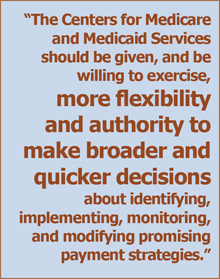Synopsis
The new health care reform law establishes a Center for Medicare and Medicaid Innovation, with the principal aim of developing provider payment models that can both improve quality of care and slow cost growth. To help the center do its job quickly and effectively, Commonwealth Fund experts offer a number of recommendations, among them: granting the center more flexibility to develop initiatives with a minimum of administrative delays; implementing a variety of payment reform initiatives, including global and bundled payment; encouraging the implementation of innovative models developed by states and private-sector entities.
Background
In addition to helping Americans obtain affordable coverage, the health care reform law contains numerous provisions for reforming the way health care providers are paid. The most noteworthy is the establishment, beginning in 2011, of the Center for Medicare and Medicaid Innovation, to be housed within the Centers for Medicare and Medicaid Services (CMS). The new center will develop innovative payment and delivery system models, with the goal of improving quality of care in Medicare, Medicaid, and the Children's Health Insurance Program, while slowing the rate of cost growth. A Commonwealth Fund staff–authored Health Affairs article makes recommendations and outlines priorities for the new center.
Recommendations for the Center for Medicare and Medicaid Innovation
-
 The center should adopt an implementation approach of "innovation with evidence development"—that is, promising models should be implemented without lengthy delays and administrative hurdles, with continuous monitoring and evaluation, as long as they appear to be successful.
The center should adopt an implementation approach of "innovation with evidence development"—that is, promising models should be implemented without lengthy delays and administrative hurdles, with continuous monitoring and evaluation, as long as they appear to be successful. - The center should develop and implement an array of payment models, including bundled and global payments that encourage providers to take responsibility for patients across the continuum of care.
- Different payment models will be needed to suit different health care markets around the country. The center should encourage promising "ground-up" models developed by states and private-sector entities.
- To increase transparency, the center should develop explicit criteria for providers participating in pilot projects and also communicate the potential rewards those providers might receive. There should be a regular method for publicly reporting forthcoming initiatives, as well as results produced by ongoing projects.
- The center should give feedback to participating providers about their performance, as well as share best practices and provide technical assistance as needed.
- CMS should move to a system of rapid data feedback, which will allow payment models to evolve as experience is gained. Initiatives should be continuously monitored and evaluated to determine if adjustments are necessary to existing pilots and to help generate ideas for future ones.
- The innovation center should coordinate with new Independent Payment Advisory Board—also created by the health care law—to promote successful models as standard payment systems under Medicare.
- The U.S. Secretary of Health and Human Services should be granted sufficient authority to select evaluation sites and implement pilot programs in a timely manner. Efforts should be made to simplify the approval process for testing payment innovations.
- The innovation center will require adequate funding and resources. The new law earmarks funds, including $5 million in 2010 for the design, implementation, and evaluation of models, and $10 billion for pilot programs initiated between 2011 and 2019.
The Bottom Line
The Center for Medicare and Medicaid Innovation has the opportunity to promote new payment models that will improve quality of care while slowing the rate of cost growth. The center should be granted sufficient flexibility to implement a variety of innovative approaches in a timely manner.


